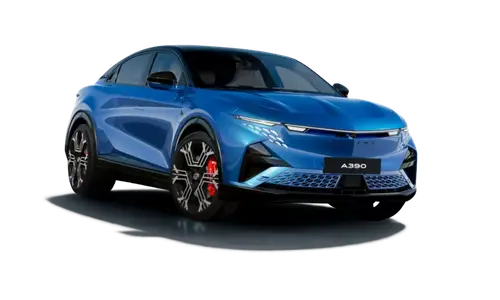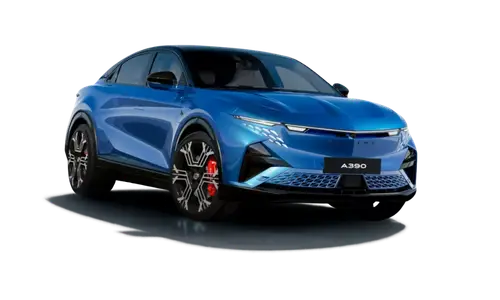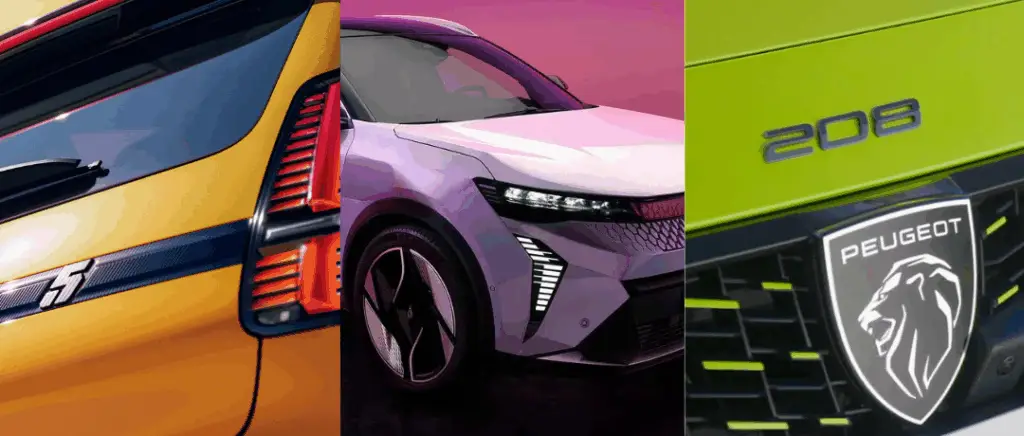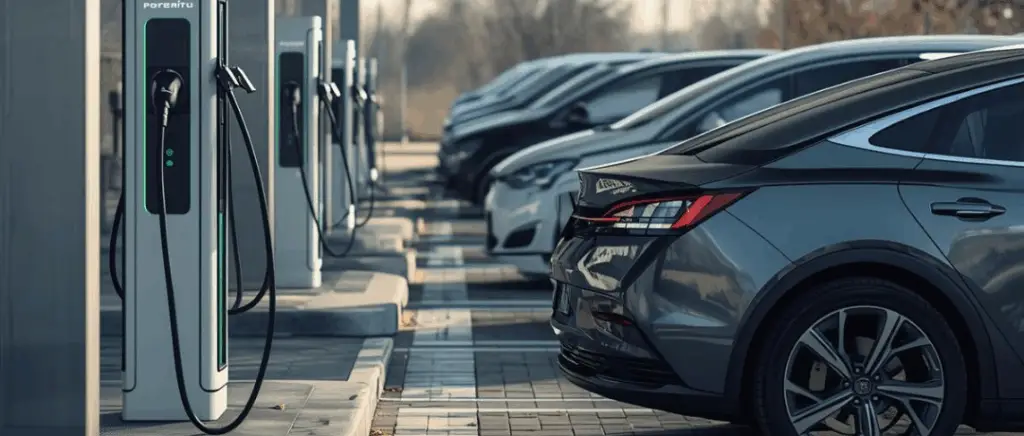You would like toto electric?
Beev offers multi-brand 100% electric vehicles at the best prices, as well as recharging solutions.
Electric car sales: some key figures
After years of dazzling growth, electric car sales will come to a significant halt in 2024.
8 months after the start of 2024, the new vehicle registrations recorded a up 1.4 %sales, totalling almost 7.2 million units. L'Spain (+4.5 %) and theItaly (+3.8 1Q3Q) experienced positive performances, albeit modest.
Conversely, the French and German markets stagnated, posting results of -0.5 % and -0.3 % respectively.
In fact, in August 2024, electric vehicle registrations fell from 43,9 % (i.e. 92,627 units) in the European Union compared with the previous year, according to the European Automobile Manufacturers Association (ACEA).
This decline is particularly pronounced in leading countries such as France and Germany.Germanywhere sales fell by 68.8 1Q3. La Franceanother key market, recorded down 33.1 %.
These figures contrast with the performance of the first months of 2024, when the growth in electrical sales was still 5 % higher in the first quarter than in 2023. However, as stated in the preamble, a number of factors have slowed this momentum, such as :
- rising raw material costs,
- supply chain disruption,
- and the reduction of public aid in certain countries.
More generally, for the first timethe electric mobility has fallen below 20 % market share that same year. According to Avere-France, this is the 4th consecutive month of lower registrations to those recorded for the same period in 2023.
To illustrate this point, here is a graph showing the fluctuations in the number of new electric cars put on the road between 2023 and 2024:
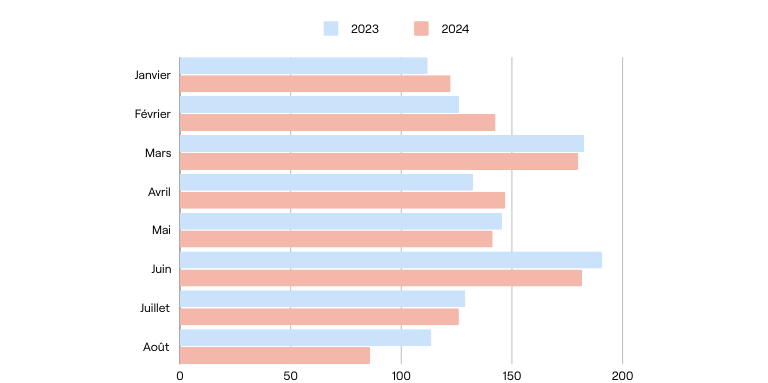
Source ACEA, data expressed in thousands
But that's not all.car emissions in Europe are below levels observed before the COVID-19 pandemic. Volkswagen indicated in September that this trend could continue for the foreseeable future.
At the same time, sales of the 3 main European carmakers were down on the previous year:
- Renault (-13,9 %),
- Stellantis (-29.5%),
- and Volkswagen (-14,8%).
Similarly, according to Reuters, sales of the electric vehicle manufacturer Tesla have fell by 43.2 % in Augustwhile those of Chinese manufacturer SAIC Motor have down 27.5 %.
However, while there has been a slowdown in the growth of new electric vehicle sales in recent months, it is important to qualify this with some encouraging figures for this market in order to understand the context.
First of all, let's remember that the market for electric vehicles has grown by leaps and bounds in recent years. To give you some concrete figures, by 2023 sales increased by 37 %representing 14.6 % of the market (compared with 12.1 % in 2022), i.e. 1 in 5 new cars purchased was electric.
To back up its claims, the association Transport & Environment (T&E) notes a steady increase in the use of electric cars by private individuals. In France, 25 % of new cars registered by private individuals in the first half of 2024 were electricThis compares with 20 % over the same period in 2023.
The same association is even keen to point out that it would be a mistake to claim that the French do not want to adopt electric cars.
Secondly, T&E pointed out that electric vehicles accounted for 10.7 % of new car registrations in companies in the first half of 2024Despite the abolition of the ecological bonus for professionals. In contrast, it was 12 % for the whole of 2023.
This figure is all the more significant given that companies are at the heart of the new vehicle market, with between 50 % and 60 % of new registrations. This increase was probably driven by the LOM Act which is getting tougher by the year, especially now that a bill has been passed to speed up the ecological transition within companies.
Read more : Proposed law: speeding up the greening of company fleets
But that's not all: the market for used electric vehicles is booming, driven by falling prices for older models. In fact, at 1st half 2024the sales of used electric cars rose by 68%. In contrast, we have an increase of only 25% for internal combustion cars.
What are the causes of the current situation?
This decline is due to several factors economic, industrial and geopolitical factors. As a result, the slowdown in electric car sales can be explained by a number of key factors, which need to be analysed to better understand the current dynamic.
Reduction/elimination of public incentives for the purchase of electric vehicles
The financial incentives have been a driving force behind the development of electric vehicles. This government aid takes several forms: environmental bonus for purchase, conversion premium for the trade-in of an old vehicle, tax credit for new vehicles, etc. charging stations...
To consult : Aid for the installation of charging points in 2024
In recent years, several countries have begun to reduce or even abolish state subsidies for the purchase of electric vehicles. This reduction inevitably leads to an increase in acquisition costs for potential buyers, dissuading consumers from switching to electric vehicles and partly explaining the slowdown in sales of new electric vehicles.
The first major reduction in 2024 was the environmental bonus. Since it was launched in France in 2007, this state aid scheme has undergone a number of changes.
Under François Hollande, it was reduced from €7,000 to €6,000 for these vehicles, before Emmanuel Macron raised it to €7,000 until the end of 2021. He then reduced by €1,000 each yearreaching 4,000 early 2024with the exception of the most modest households who continue to benefit from a 7 000 € (for households with taxable income not exceeding €15,400). Please note that this ecological bonus is no longer available for professional leasing.
Read more : Electric car leasing for professionals: the essential guide
Discover our exclusive offers
At the same time, Gabriel Attal, the former Prime Minister, wrote to the Ministry for Ecological Transition on 29 August, envisaging a ⅓ reduction in subsidies for electric vehicles. In other words, he wanted a a €500 million reduction in the funds allocated to promoting the electrification of new vehicles as part of the preparation of the 2025 Finance Act budget.
To make matters worse, in recent months the European Commission has also introduced additional customs duties, known as "countervailing duties", on Chinese vehicles or vehicles assembled in China.
The aim is to combating unfair competition and dumpingUnfortunately, this has had the effect of increasing the price of electric vehicles.
For further information : Tax on Chinese electric cars: the impact on Europe and Tax on Chinese electric cars: 30 models affected
However, this decline has been partly offset by the introduction of social leasing, which allows people to take out a social security contract with a social insurance company. offer to hire an electric car for €100 a month.
This scheme, aimed at the most modest households, has been a resounding success: by the end of January 2024, over 90,000 people had submitted an application to access the system. A month later, around half of these requests had been approved (over 50,000 orders), far exceeding the State's initial objectivewhich was between 20,000 and 25,000 electric vehicles.
In other words, it demonstrates the growing interest in electric mobility.
For further information : An electric car for €100 a month?
Impact of the general economic context: inflation, cost of raw materials and rising electricity prices
The current economic climate is having a major impact on the market for electric vehicles. This increase, estimated at 91 % for certain raw materialsThis is a heavy burden on manufacturers, who pass on some of these costs to consumers. From 2022 prices of key battery components have risen significantlyor :
Moreover, widespread inflation is eroding the purchasing power of consumers, who are becoming more reluctant to invest in expensive goods.
This particularly affects electric vehicles, whose prices, although gradually falling, are still very high. high compared to entry-level thermal models (estimated at 8,000 on average for certain segments). This inflation is driving consumers to prioritise immediate and essential expenditureRather than turning to long-term purchases such as an electric vehicle.
Nevertheless, it is important to note that 2024 has offered a wide range of electric vehicles at affordable prices, such as :
- the MG4,
- the Renault 5,
- the Dacia Spring,
- the Citroën ë-C3,
- or the Renault Twingo E-Tech.
At the same time, some types of electric vehicle are less expensive to insure, which is another reason to buy one.optimise your costs and smooth out the initial investment in an electric car.
To consult : Electric cars: which models are the cheapest to insure?
On the other hand, one of the main advantages of electric vehicles is that they can be used in a wide variety of ways. lower running costs than internal combustion vehiclesThis is thanks in particular to the fact that electricity costs less than fuel. For example, the estimated cost of driving 100 kilometres in an electric car is around €2.9.compared to an average of 7.5 for a petrol vehicle.
However, the recent surge in electricity prices linked to the European energy crisis and tensions on the energy markets is reversing this trend.
Read more : The impact of rising electricity prices on my electric car
As a result, electric vehicle owners were faced with higher recharging costs, eroding one of the main arguments in favour of electric vehicles.
But there's good news! Forecasts for electricity tariffs in France are encouraging, with a significant reduction expected in February 2025. The former Minister for the Economy, Bruno Le Maire, has revealed a 10 to 15 % drop in pricesspecifying that this reduction is the result of :
- revitalising the nuclear sector
- and investment in renewable energies.
This announcement comes after a series of fare increases in 2023 and 2024, and is intended to compensate for the anticipated increase in gas prices of 12 % in July 2024.
For further information : Lower electricity prices speed up the transition to electric vehicles
All in all, this "pause" could turn out to be a "break". an opportunity to rethink the supply chain, optimise industrial processes and thus eventually offer more accessible vehicleswhile reinforcing our commitment to sustainable mobility.
Insufficient recharging infrastructure?
One of the main reasons for the slowdown in electric car sales is the lack of public charging points.
Currently, around ⅔ of French people think that the network of charging points is inadequate to meet demand the electrification of the car fleet. This situation is creating a psychological barrier for many potential buyersThis is holding back the widespread adoption of electric vehicles.
To consult : The problem of public charging points in France
Indeed, the lack of terminals available in rural areas and even in certain densely populated towns exacerbates this problem. But that's not all: in addition to the difficulty some people have in paying via a reload card or a QR code and not by credit card on all terminals, a NEW SCAM was born.
Read more : Charging station: the new QR code scam
However, these comments need to be qualified: the France remains one of the best-equipped countries in terms of recharging infrastructure with date 146,771 recharging points open to the public according to Avere-France (August 2024 figures). In other words, that's more than 37% compared with 2023, encouraging figures that will soon erase the brakes on electromobility.
You want to order your Beev recharge card ?
Thanks to our card,recharge your electric car with ease at all the charging points available in Europe.
In addition, theoptimising existing infrastructures remains a major challengeThis will require massive investment to :
- improve their accessibility,
- reduce charging times,
- and increase the power of the terminals.
Electric cars: our responses to misinformation and conspiracy bashing
An unfavourable energy balance, the impossibility of recycling batteries... both in the media and on social networks, a a wealth of information suggests that the electric car is not as environmentally friendly as is often claimed.
So, with so much misinformation circulating about the electric car, we're going to untangle the truth from the false in order to enlighten you and deconstruct the top 3 untruths tainting the image of eco-friendly vehicles.
If you wish, we have written a full article on the subject: Misinformation about electric cars: when falsehoods slow down innovation
Do electric cars really pollute more than combustion-powered cars?
One of the most common arguments against electric cars is that they have a greater environmental impact than combustion engines, mainly because due to the production of batteries.
However, studies show that over their entire lifecycle, electric cars generate far fewer CO₂ emissions. According to Avere France, a an electric car emits 22 % less CO2 than an equivalent diesel model and 28 % less than a petrol model. This remains true regardless of :
- the origin of metals,
- of the manufacturing site,
- or the vehicle's charging mode.
In short, the electric car is considered to be the most environmentally-friendly means of individual transport, since it emits 3 to 4 times less CO₂ than its thermal equivalent.
💡Good to know Pollution is not just about air quality; it also includes noise pollution. Electric cars are likely to have a significant effect on people's health.
However, although the manufacture of batteries is energy-intensive, the use of electricity - often derived from renewable sources - is not. quickly compensates for this initial footprint.
Read more : Recharging your electric car with green energy: a good option?
Aren't electric car batteries difficult to recycle?
Another common misconception is that batteries cannot be recycled, which would contribute to a new type of pollution.
In fact, efficient recycling processes already exist and are making rapid progress. Companies specialising in the sector now believe that they are capable of recycle between 70 % and 90 % of a car's total weight. battery. Although the recycling rate is not yet 100 %, it far exceeds current regulatory requirements. Certain techniques can also recycle up to 95 % battery components.
💡Did you know ? batteries, once reduced to 70 % of their capacity, can be reused even before being recycled!
To consult : Recycling electric car batteries: European plan introduced
In addition, technological innovations in batteries are progressing at a steady pace, pointing to the imminent development of fully recyclable batteries. It's also worth noting that lithium-ion batteries (frequently used in electric cars), are largely recyclable and require little maintenance, especially as the battery life is between 8 and 10 years.
What's more, to improve traceability and reduce the environmental impact of electric vehicle batteries, including those for cars, bikes and scooters, they will be fitted with a QR code passport. From 2027the batteries must comply with acarbon footprint to be marketed in Europe.
For further information : The electric car battery passport: what is it for?
L'autonomy electric vehicles really a barrier?
Among the main obstacles to the adoption of electromobility, the question of the range of electric vehicles systematically features in the top 3.
However, technological advances have enabled electric cars to achieve a much greater range, and they can now travel between 300 and 600 km per charge, depending on the model, or even more.
For example, we have the Mercedes-Benz EQS 450+ which offers a 725 km range (WLTP cycle), the Tesla Model S Dual Motor with its 634 km rangeor the Mercedes EQE (639 km range).
To consult : Top 10 electric cars with the best range in 2024
It's also worth noting that with the continued expansion of charging points across Europe, long-distance travel is now more accessible (despite the problems of disparity and breakdowns), lessening fears of limited range.
Read more : Top 10 best charging stations in 2024
In addition, thereal autonomy meets the needs of the majority of drivers who carry out daily journeys of less than 50 kilometres.
💡Did you know ? 95 % of car journeys made by the majority of French people never exceed 300 km.
Conclusion: A necessary turning point for a sustainable future
The current slowdown in sales of electric cars, although significant, is a sign of the future, does not call into question the underlying trend towards cleaner, more sustainable mobility. While challenges remain, such as access to recharging infrastructure and fluctuating energy prices, solutions are being developed.
The carmakers are investing heavily in research and development of new battery technologieselectric vehicles, making them even more environmentally friendly. efficient and affordable. At the same time, public authorities are introducing incentive policies to encourage the adoption of these vehicles and speed up the energy transition.
At BeevWe are convinced that the future of mobility is electric. By offering intelligent recharging solutions tailored to every need, we are helping to make the transition to electric vehicles smoother and more accessible.
So, are you ready to take the plunge and go electric? Discover our offers on our website and join the community of drivers committed to a greener future.

















